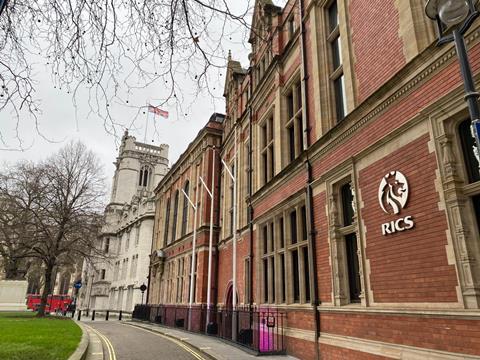Secretariat managing director Paul Roberts adds membership of the council should be ŌĆśimmediately reviewedŌĆÖ
All current members of the governing council should be removed and replaced with new blood elected by members of the Royal Institution of Chartered Surveyors (RICS), the managing director of international law firm Secretariat has said.
Paul Roberts said it was essential for the council to be ŌĆ£reviewed immediatelyŌĆØ before the RICS can regain the trust of its 130,000 members.
Roberts, whose firm has a string of offices across the US, Europe and Asia, said that the 21 members of the council should ŌĆ£carefully consider their position and make way for members who are voted on by the membershipŌĆØ.

The comments came in a letter to ║├╔½Ž╚╔·TV signed by three RICS members ŌĆō Roberts and chartered surveyors Thomas Dempsey and Russel Welsh.
It follows the publication of an independent review by Alison Levitt QC into a governance scandal at the institution which led to the resignations of four of the RICS senior team, including chief executive Sean Tompkins and president Kathleen Fontana.
>> Also read: RICS reforms: what changes do members want after bombshell report?
>> Also read: RICS governance scandal: coverage all in one place
Governing council chair and former president Chris Brookes has also stepped down in the wake of the reportŌĆÖs findings, published this month, along with management board chair Paul Marcuse.
The RICS said that the current members of the governing council, which was elected in late November 2019, were not in place during the events covered in LevittŌĆÖs report.
But in their letter, Roberts, Dempsey and Welsh said they understood that many of the members had been endorsed or supported by the former senior RICS staff under a ŌĆ£flawedŌĆØ election process.
The trio added that new members should now be elected to the council ŌĆ£without any influence whatsoever from RICS employeesŌĆØ.
Members of the RICS have complained that the current election process for the governing council is not democratic enough and leads to subordinate boards with governing council representatives being populated from a prescriptive list of candidates.
Following the complaints, published in ║├╔½Ž╚╔·TV earlier this year, the RICS said that it ŌĆ£actively encourages participation in the governing council election process from our professionals, both in voting and also submitting themselves for the nomination processŌĆØ.
LevittŌĆÖs report was ordered by the RICS following a backlash among members against the dismissal of four non-executive directors from the institutionŌĆÖs governing council.
The non-executives ŌĆō Amarjit Atkar, Simon Hardwick, Bruce McAra and Steve Williams ŌĆō were ousted in November 2019 after refusing to accept the findings of an internal review into the handling of a critical financial report.
In her report, Levitt said that the RICS had made it ŌĆ£as difficult as possibleŌĆØ for people to contact her, adding that management staff and others had given an ŌĆ£impression of reluctant acquiescenceŌĆØ from an early stage in her investigations.
The RICS has said it accepts the conclusions of the Levitt review and is implementing all her recommendations.
Tell us what you think should happen next at the RICS
Have the resignations come as a surprise? Does the report change how you feel about the RICS and its reputation? Which recommendations in the report stand out? Is another independent review into the RICSŌĆÖ future purpose the right way to go? How quickly does the RICS need to take action to address the failures highlighted in the review?
This governance scandal throws up so many questions, and we want to know what you think about it all.
> To have your say, please email the news team at tom.lowe@building.co.uk



























